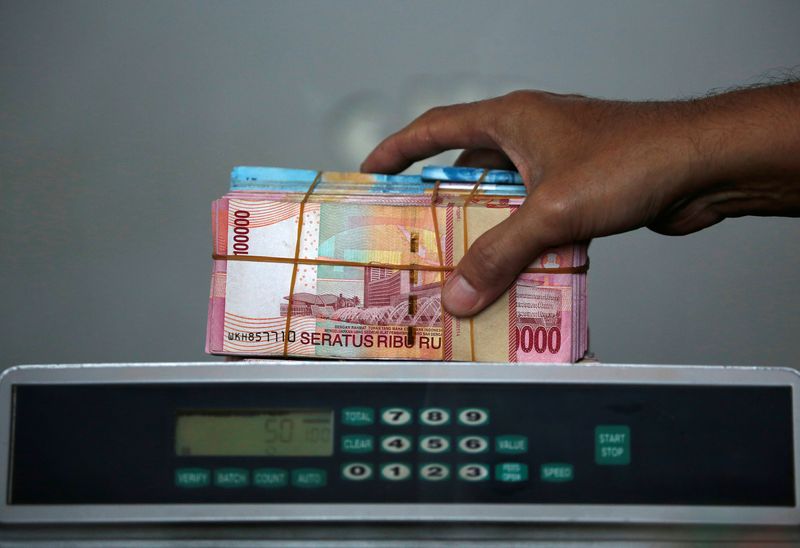By Rae Wee and Stefanno Sulaiman
SINGAPORE/JAKARTA (Reuters) - Indonesia's economy was primed for monetary easing later this year, but an unwelcome plunge in its currency is complicating matters for Bank Indonesia and could force it to grudgingly raise rates as early as next week.
As Indonesian markets returned from a long Eid al-Fitr holiday this week, the rupiah sank to a four-year low against a dollar buoyed by expectations that a hot U.S. economy will force the Fed to keep rates higher for longer.
As it slid past the psychological level of 16,000 to a dollar, stacking up a 5.25% loss for the year, some market participants felt Bank Indonesia (BI) might need to do something as drastic as a rate rise to arrest the slide.
BI is the only central bank in the world whose main mandate is currency stability.
Through 2023 and so far this year, it has used a range of intervention tools to keep the rupiah reined in as the dollar soared. Until last month, it was even expected to be among the first central banks in emerging Asia to start cutting rates.
As BI prepares to review policy on April 23, the thinking is changing. A hike would be its first since October.
"I think the risk of a hike is not small. I wouldn't put it as a baseline because they did hike previously, but I would think it's not small," said Alvin Tan, head of Asia FX strategy at RBC Capital Markets.
"I think definitely, the rhetoric will have to turn a bit more hawkish in order to lend support to the currency."
A rate rise would help bump up the yields that have been the rupiah's big appeal historically, as well as the cause of its frequent bouts of volatility. That's even as tame inflation and growth concerns do not call for one.
Once a popular carry-trade currency, Indonesia's high-yielding bond market has lost appeal due to currency volatility and the wafer-thin spreads it offers over dollar markets.
Spreads between 10-year U.S. Treasuries and Indonesian government bonds were as wide as 7.5 percentage points four years ago. Now they are two points.
Foreigners hold just 14% of outstanding Indonesian government securities, while back in December 2020 they owned a quarter.
MORE NEEDED
Bank Indonesia has been using a unique mix of direct rupiah buying in the spot foreign exchange and domestic non-deliverable forwards (DNDF) markets as well as purchases of government bonds to stem the rupiah's decline.
To be sure, the efforts have helped keep the rupiah from falling as much as peers such as the Korean won.
BI's intervention in the DNDF market has also tamped down expectations of rupiah depreciation, with markets expecting a mere 0.5% decline in the next six months.
Edi Susianto, BI's head of monetary department, told Reuters the central bank has been working with "relevant stakeholders" to prevent excessive rupiah volatility, for instance by staggering the demand for dollars from state-owned energy company Pertamina.
"So far the coordination with Pertamina is going very well. If the demand is for later, then it is recommended to not enter the FX market for now," said Susianto.
The central bank spent about $6 billion in the first quarter alone, which left its foreign exchange reserves at $140.4 billion at the end of March.
But BI could be close to exhausting all its options, particularly as Fed rate cut bets recede.
Daniel Tan, portfolio manager at Grasshopper Asset Management, said his fund has bought dollar-denominated bonds issued by Indonesian state firms this year, rather than risking exposure to rupiah assets.
Some investors are betting on eventual Fed rate cuts later this year giving Indonesia's rupiah some reprieve.
Jerome Tay, investment manager of Asia fixed income at abrdn, said the firm is overweight on both rupiah on a relative value basis and Indonesian government bonds, citing reasons such as tame inflation, the government's cash surplus and expectations for low volatility.
"Foreign positioning is still very light and bonds are well supported by domestic investors," he said, adding he expects foreign money to return when the Fed starts easing policy.
For now, a foot-dragging Fed continues to cast a cloud.

Bank of America's Asia and ASEAN economist Kai Wei Ang has pushed out expectations for BI's first rate cut to December from June, aligning with the Fed.
"Any BI hike in response to sharp currency depreciation pressure cannot be entirely ruled out, but it could be delivered in a manner to 'surprise' the market and justified on the basis of upside risks to inflation from imported inflation and energy."